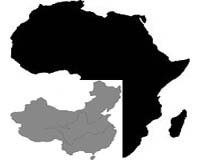 |
Singapore (AFP) Nov 6, 2009 Asia-Pacific powers including the United States, China and Russia are expected to call next week for sweeping cuts in greenhouse gas emissions on the final countdown to a crunch climate meeting. US President Barack Obama and 20 other regional leaders will also say it is too early to wean their economies off stimulus spending, according to a draft summit communique obtained by AFP on Friday. At their November 14-15 summit in Singapore, the leaders of the Asia-Pacific Economic Cooperation (APEC) forum will call man-made climate change "one of the biggest challenges facing the world", the draft declaration said. "We believe that global emissions will need to peak over the next few years, and be reduced to 50 percent below 1990 levels by 2050, recognising that the time frame for peaking will be longer in developing countries," it said. The leaders including Obama, Chinese President Hu Jintao and Russian President Dmitry Medvedev will stress their commitment to reaching a "good agreement in Copenhagen", it added. The December gathering in the Danish capital will try to thrash out a new treaty to tackle global warming, but preparatory talks have become deadlocked and officials warn that the process could drag on into next year. Obama, who will stop in Singapore as part of his first presidential tour of Asia, faces a recalcitrant Congress and his administration wants more action from developing nations such as China. The developing powers want more money from the industralized world to combat what they say is a Western-produced problem. The draft APEC text said global action to cut emissions should "be accompanied by measures to support the most vulnerable countries to assist them to adapt to the adverse impact of climate change". On Thursday, US Senate Democrats pushed a climate change bill through a key committee, shrugging off a Republican boycott. But it could still be a long way before it can clear the full Congress. The Senate bill calls for a 20-percent emissions cut by 2020, more ambitious than a House of Representatives version passed in June calling for a 17 percent reduction from 2005 levels. In September, Hu told the United Nations that China would reduce the carbon intensity of its economy by a "notable margin" by 2020, but did not provide a figure. Carbon intensity is the measure of greenhouse gas that is emitted for each dollar of gross domestic product. On the economic crisis, the APEC leaders were expected to say: "We will maintain our economic stimulus policies until a durable economic recovery is secured." But the draft stressed that "economic recovery is not yet on a solid footing". The United States implemented a 787-billion-dollar Recovery Act in February which the White House says has saved or created nearly 650,000 jobs, and likely more than a million. And analysts say that massive stimulus packages rolled out by Asian governments played an important role in helping the region weather the downturn better than the United States or Europe. The Asian packages totalled more than one trillion US dollars, according to a tally by Standard and Poor's, led by 585 billion dollars in spending by China. The APEC summit's host, Singapore Prime Minister Lee Hsien Loong, said this week that winding down the stimulus packages to make way for growth led by the private sector should be managed carefully. "How exactly it has to be phased out... and how you balance the risks of withdrawing too quickly and administering too much adrenalin, that is something which will have to be discussed by the finance ministers and the central banks and calibrated as we go along," he said. The leaders are also expected to "firmly reject all forms of protectionism" and work for a successful conclusion of the Doha Round of global trade talks by 2010. They will instruct their officials to draw up by the end of next year ways to achieve a free-trade zone stretching from Chile to China, it said, reaffirming a longstanding goal of the 20-year-old APEC grouping. Share This Article With Planet Earth
Related Links
 China's Africa investments under harsh spotlight
China's Africa investments under harsh spotlightBeijing (AFP) Nov 6, 2009 As Chinese firms pour billions of dollars into mining, energy and infrastructure deals in Africa, Beijing is turning a blind eye to rogue regimes that stand to reap the benefits, observers say. Guinea's military rulers are the latest on the continent to receive a pledge of a massive infusion of Chinese cash -- at least seven billion dollars over five years in the mining sector from China Inv ... read more |
|
| The content herein, unless otherwise known to be public domain, are Copyright 1995-2009 - SpaceDaily. AFP and UPI Wire Stories are copyright Agence France-Presse and United Press International. ESA Portal Reports are copyright European Space Agency. All NASA sourced material is public domain. Additional copyrights may apply in whole or part to other bona fide parties. Advertising does not imply endorsement,agreement or approval of any opinions, statements or information provided by SpaceDaily on any Web page published or hosted by SpaceDaily. Privacy Statement |